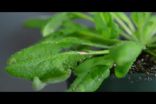(Press-News.org) BUFFALO, N.Y. – We're often told that worrying can be harmful to one's health. But University at Buffalo researchers say that when it comes to preventing skin cancer, a little fear is good for you.
In a study published in the Journal of Behavioral Medicine, the UB researchers found that fear and worry about skin cancer had a bigger influence on people's use of sunscreen than information about the statistical likelihood of developing the disease.
"Most health behavior studies don't account for the more visceral, emotional reactions that lead people to do risky behaviors, like eat junk food or ignore the protective benefits of sunscreen," says Marc Kiviniemi, lead researcher and assistant professor of community health and health behavior.
"This study is important because most of what we do in public health communications focuses on spreading knowledge and information. By not addressing emotions, we're potentially missing a rich influence on behavior when interventions don't address feelings."
Kiviniemi's study analyzed data from a nationwide study conducted by the National Cancer Institute. Nearly 1,500 randomly selected participants with no personal history of skin cancer were asked about their sunscreen use, and questioned to gauge their perceived risk and worry for getting skin cancer.
Frequency of sunscreen use varied, with 32 percent reporting ''never'' using it, and 14 percent ''always'' using it. Education was associated with increased sunscreen use and men and non-White participants were both less likely to use sunscreen.
In each case, however, worry more directly influenced people's behavior than informational findings, and increasing degrees of worry were associated with increased sunscreen use.
"Our research looked at the interplay of emotions and facts in decision making– that is, how do cognitive and affective risks jointly work to influence behavior?" says Kiviniemi. "The nature of their interrelation as an influence on behavior has not been examined until this study."
UB researchers say that affective risk – fear and worry about a health issue, in this case skin cancer – and cognitive risk – the informational component – are both known influences on people's health behaviors.
However, they are often treated separately or are pitted against one another as "rational" versus "irrational" influences, says Kiviniemi.
"These findings show that clinicians might want to think more about feelings when encouraging people to use sunscreen," says Kiviniemi. "In addition to providing educational information about risk, encouraging people to consider how they feel about cancer and how worried they are about it might inspire preventive behaviors."
While ultimately public health professionals can use the results to design better intervention tools, researchers are still a few steps away from understanding how to shape fear so that it is beneficial, rather than paralyzing, adds Kiviniemi.
Kiviniemi will conduct further research to examine the same relationship between risk perception and behavior in other types of health behaviors, such as colonoscopy screening and condom use.
INFORMATION:
A photo of Kiviniemi is available here: http://www.buffalo.edu/news/releases/2014/07/002.html.
Fear, not data, motivates sunscreen users, research shows
2014-07-01
ELSE PRESS RELEASES FROM THIS DATE:
NIST test house exceeds goal; ends year with energy to spare
2014-07-01
The net-zero energy test house at the National Institute of Standards and Technology (NIST) in suburban Washington, D.C., not only absorbed winter's best shot, it came out on top, reaching its one-year anniversary on July 1 with enough surplus energy to power an electric car for about 1,440 miles.*
Watch the YouTube video at https://www.youtube.com/watch?v=iJZrOhPk4kg
Despite five months of below-average temperatures and twice the normal amount of snowfall, NIST's Net-Zero Energy Residential Test Facility (NZERTF) ended its one-year test run with 491 kilowatt hours ...
Biomarker predicts effectiveness of brain cancer treatment
2014-07-01
Researchers at the University of California, San Diego School of Medicine have identified a new biomarker that predicts whether glioblastoma – the most common form of primary brain cancer – will respond to chemotherapy. The findings are published in the July print issue of Oncotarget.
"Every patient diagnosed with glioblastoma is treated with a chemotherapy called temozolomide. About 15 percent of these patients derive long-lasting benefit," said Clark C. Chen, MD, PhD, vice-chairman of Academic Affairs, Division of Neurosurgery, UC San Diego School of Medicine and the ...
Plants respond to leaf vibrations caused by insects' chewing, MU study finds
2014-07-01
VIDEO:
Experiments by Heidi Appel and Rex Cocroft at the University of Missouri mark the first time scientists have shown that a plant responds to an ecologically relevant sound in its...
Click here for more information.
COLUMBIA, Mo. – Previous studies have suggested that plant growth can be influenced by sound and that plants respond to wind and touch. Now, researchers at the University of Missouri, in a collaboration that brings together audio and chemical analysis, have ...
Reigning in chaos in particle colliders yields big results
2014-07-01
WASHINGTON D.C., June 30, 2014 – When beams with trillions of particles go zipping around at near light speed, there's bound to be some chaos. Limiting that chaos in particle colliders is crucial for the groundbreaking results such experiments are designed to deliver.
In a special focus issue of the journal Chaos, from AIP Publishing, a physicist at the European Organization for Nuclear Research (CERN) details an important method of detecting and correcting unwanted chaotic behavior in particle colliders. The method is helping accelerator physicists design high-performing, ...
Research reveals a gender gap in the nation's biology labs
2014-07-01
CAMBRIDGE, MA -- Among the sciences, biology consistently attracts the greatest numbers of women to graduate school and academic careers. About half of all biology graduate students are women, and 40 percent of biology postdocs are female. However, those numbers drop dramatically among faculty members: Nationwide, only 36 percent of assistant professors and 18 percent of full professors are women.
A new study reveals a possible explanation for this discrepancy: In the labs of the highest-achieving male biology professors — winners of the Nobel Prize, the National Medal ...
Study reveals that many people are oblivious to how they come across to counterparts and colleagues
2014-07-01
NEW YORK—Jill Abramson was recently ousted from her position as the executive editor of The New York Times for being, among other things, too "pushy." But did Abramson—who has also been described by the media as "polarizing" and "brusque"—know during the course of her tenure that others viewed her as being overly assertive? A new study from the Columbia Business School suggests that there's a great chance she didn't.
"Finding the middle ground between being pushy and being a pushover is a basic challenge in social life and the workplace. We've now found that the challenge ...
All the world's oceans have plastic debris on their surface
2014-07-01
However, central surface waters of the oceans may not be the final destination of plastic debris since, as indicated by the study performed by the Malaspina Expedition, large amounts of microplastics could be passing to the marine food chain and the ocean floor. Results of the study, led by the University of Cadiz (Spain), have been published in the journal Proceedings of the National Academy of Sciences (PNAS).
Andrés Cózar, researcher from the University of Cadiz, explains: "Ocean currents carry plastic objects which split into smaller and smaller fragments due to solar ...
Genetic evidence that body mass increases the risk of asthma in mid-childhood
2014-07-01
Some of the increase in asthma risk toward the end of the 20th century could be attributed to the increase in body mass index (BMI) in mid-childhood, according to new research published in this week's PLOS Medicine. The study, led by Raquel Granell from the University of Bristol, UK, and colleagues, provides genetic evidence that higher fat mass and lean mass increase the risk of asthma in mid-childhood.
The incidence of asthma, a chronic condition caused by inflammation of the airways, has been rising steadily over the past few decades, and it is estimated that 200� ...
Cesarean section linked to slight increase in future stillbirth and ectopic pregnancy
2014-07-01
Caesarean section is associated with a slightly increased rate of subsequent stillbirth and ectopic pregnancy, according to a large study of women living in Demark, published in this week in PLOS Medicine. Given the global increase in Caesarean rates, the results of the study, which was conducted by Louise Kenny and colleagues from University College Cork, Ireland and Aarhus University, Denmark, are of interest to pregnant women, their partners, and healthcare providers.
The researchers obtained data for 832,996 women from Danish national registers regarding their first ...
Catheter ablation a first-line treatment for atrial flutter
2014-07-01
Use of catheter ablation is not only beneficial for treating atrial flutter but also can significantly reduce hospital visits – both inpatient and emergency – and lower the risk for atrial fibrillation, according to research by UC San Francisco.
The study is in the July issue of PLOS ONE and available online.
"We've seen firsthand in our clinical experience that atrial flutter is difficult to control with drugs, even more than atrial fibrillation," said senior author Gregory Marcus, MD, director of clinical research in the UCSF Division of Cardiology. "Based on our ...




